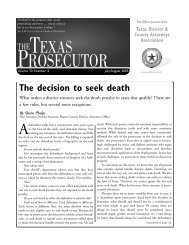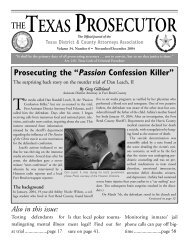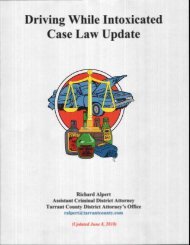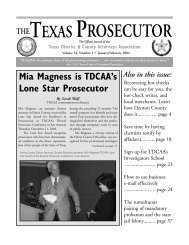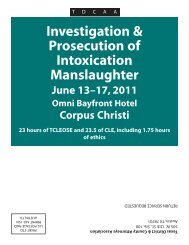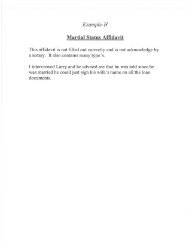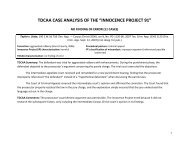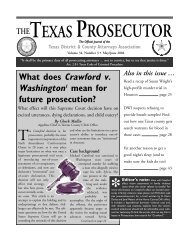Driving While Intoxicated Case Law Update - Texas District ...
Driving While Intoxicated Case Law Update - Texas District ...
Driving While Intoxicated Case Law Update - Texas District ...
You also want an ePaper? Increase the reach of your titles
YUMPU automatically turns print PDFs into web optimized ePapers that Google loves.
extrapolation evidence, the trial court properly submifted the per se theory of intoxication as the<br />
evidence supported an inference the defendant was intoxicated under both theories.<br />
T. PROPERTO SUBMIT INSTRUCTION THAT INTOXICATION CAUSED BY DRUGS<br />
Quellette v. State,2011 WL 4809822 (Tex.Crim.App. 2011).<br />
Even though there was no testimony - expert or otherwise - as fo whether the particular drugs found<br />
in Quellette's vehicle could have an intoxicating effect or whether Quellefte's actions, demeanor, and<br />
conduct were consistent with being under the influence of drugs or under the influence of a<br />
combination of drugs and alcohol, it was proper for judge to include the language concerning<br />
intoxication by drugs in the jury instruction.<br />
U. DEFINITION IN JURY INSTRUCTION SHOULD BE LIMITED TO EVIDENCE<br />
PRESENTED AT TRIAL<br />
Erickson v. State, 13 S.W.3d 850 (Tex.App.-Austin 2000, pet. ref'd).<br />
ln this case, the Court instructed the jury that a person is intoxicated within the meaning of the law<br />
"when such person does not have the normaluse of hrs physical or mental faculties by reason of<br />
the introduction of alcohol, a controlled substance, a drug, or a combination of two or more of these<br />
subsfances into the body, tracking the charging instrument and the statutory definition." There was<br />
no evidence at trial that defendant consumed any intoxicant except alcohol. For that reason, the<br />
trial Court should have limited the definition in the instructions to just refer to alcohol. This error was<br />
found to be harmless because the prosecutor never suggesfed that the jury could convict on the<br />
basis of a finding that appellant was intoxicated by the use of a controlled substance or drug, either<br />
alone or in combination with another subsfance.<br />
Ferguson v. State, 2 S.W.3d 718 (Tex.App.-Austin 1999, no pet.).<br />
ln this case, the term "intoxicated" was defined in the charging instrument and the jury charge as<br />
"not having the normal use of one's physical or mental faculties by reason of the introduction of<br />
alcohol, a controlled substance, a drug, a substance or ifs vapors that contain a volatile chemical,<br />
an abuseable glue, or an aerosol paint, or a combination of two or more of those subsfances rnfo<br />
the body." The statute does not include within its definition of "intoxication" the words "a substance<br />
or its vapors that contain a volatile chemical, an abuseable glue, or an aerosol paint." There was no<br />
evidence presented at trial that the defendant's alleged intoxication was caused by the introduction<br />
into her body "a subsfance or its vapors that contain a volatile chemical, an abuseable glue, or an<br />
aerosol paint." For these reasons and the fact that the prosecutor referred to the erroneous charge<br />
in argument, the error was found to be harmful and the case was reversed.<br />
124



